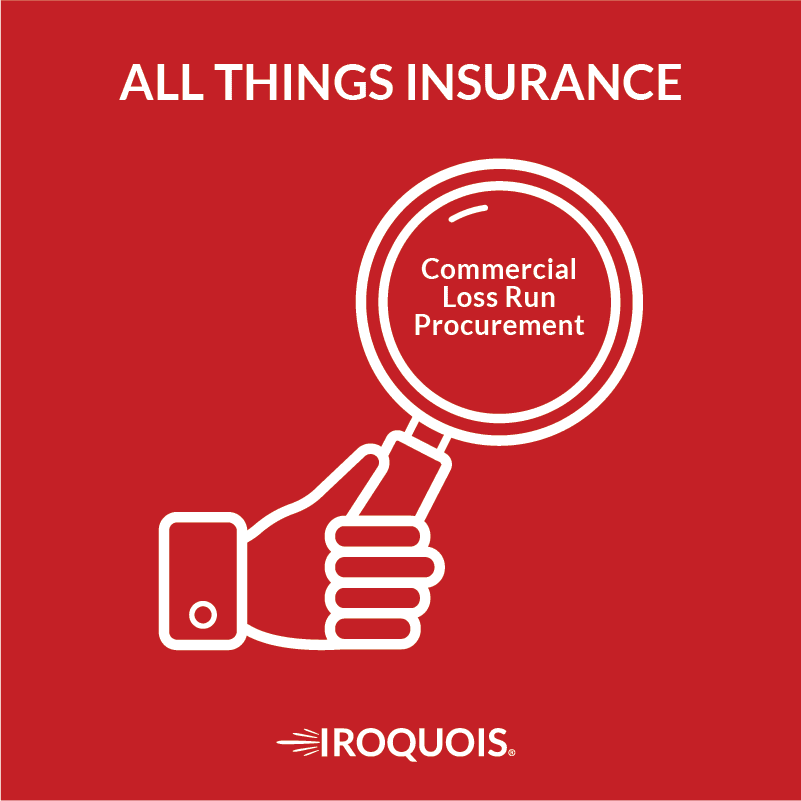Obtaining loss runs for a prospective new commercial account without tipping off the incumbent agent can be a real challenge. One way to simplify the process is to work with All Things Insurance. Matt Doman, CEO of ATIN, provides simple solutions to commercial loss run procurement. Instead of wasting time as an insurance producer waiting in phone hold lines or being bounced around from one department to the next for the information you need, outsource it. This episode highlights all of the ways that a service like ATIN can become a personal concierge for an independent insurance agency. Check out all of our vendors here.
Edwin K. Morris (5s):
Welcome to the trusted advisor podcast brought to you by Iroquois Group Iroquois is your trusted advisor on all Things Insurance I’m Edwin Kay Morris Matt Doman owner of AllThingsInsurance.net or A T I N has spent the past 12 years specializing in Commercial Loss Run Procurement. He has been refining the methods to successfully facilitate over 30,000 requests per year, and the ever-changing landscape of carriers and their requirements ATIN was started by a frustrated agent. What was causing her frustration.
Matt Doman (43s):
It’s very difficult. Getting your insured. When you’re trying to quote new commercial business, you are dealing with a business owner who’s engaged, running their own business. So you may have gotten their attention to provide them a quote, but the more you ask them in the process, the less likely they are to follow through with that for you, all of the steps required for the insured to get that information for you can make the process more complicated than it’s worth for them in order to get the quote, our services designed to simplify that process as much as possible for the business owner, for the insured and allow my customers, the insurance agent, who’s trying to provide the quote, the ability to handle as much as that process and get as many of as those steps automated as possible.
Matt Doman (1m 33s):
So rather than having to ask a business owner to prepare a letter, in some cases, depending on the side of the business, they might not have their own letterhead, which is one of the requirements asking them to prepare a letterhead if they don’t have it and come up with the language necessary to request the information often is a big ask for somebody who is also running their own business. So preparing that form for them and simplifying it to the point where they just need to sign off on the language that we prepared. It was a big, big benefit to the business owner, which is a benefit to our customer in completing that process
Edwin K. Morris (2m 13s):
Well it simplifies to a degree. And it demystifies a lot of the, the headaches by the sounds of it, this pain point lead to a solution that needed to have happen. What’s changed since you were first in this aspect of the industry, what do you see? Is it
Matt Doman (2m 30s):
A lot has changed? I’m the biggest change is The efficiently, digitizing and automating the processes. When I came on to the company in 2007, electronic signatures were not very widely accepted, but over the years, primarily DocuSign being one of the pioneers has made a lot of headway. And the insurance industry in standardizing, the acceptance of electronic signatures DocuSign has a whole division dedicated just to the insurance industry, advocating for the acceptance of electronic signatures and really standardizing that as an accepted practice that has really simplified the process.
Matt Doman (3m 15s):
And whereas when I started with This, most carriers would only accept request to be a fax. There’s still a large portion of sort of, you know, dinosaur way back procedures they’re, but a lot more carriers are providing an email address for Loss Run requests. You know, Loss runs at whatever Carrier, they’re not only accepting requests via email, but also sending out that information via email to the insured. So that’s made things a lot easier and it it’s it’s really come a long way.
2 (3m 46s):
Right? So it sounds like you’ve become a bridge, your providing a bridge service that connects these two parts, right? And as a technology solution that helps automate this whole piece that is not as laborious as it was, what five years ago, 10 years,
Matt Doman (4m 3s):
Definitely. Over the past 10 years, there’s been a lot of change. Yeah.
2 (4m 7s):
It was a particular challenge in this Loss Run Procurement that is so difficult for agents.
Matt Doman (4m 13s):
The principle that makes all this work is that the Carrier is obligated to provide us information to their insured. So as long as the insured, the business owner sends in a signed request, the carrier is obligated to provide that information, but the carrier has no obligation to my customers, the insurance agent, who’s trying to provide the quote and they definitely don’t have any obligation to me. So navigating those, the legal logistics there and finding that sweet spot where we’re able to present a request in a way that maintains that legal obligation of the Carrier to their customer, but also make space for the third party, which is my customer.
Matt Doman (4m 58s):
And then technically the fourth party, which is my business to be able to go in there and resolve any compliance issues or delivery issues in the process. There,
2 (5m 7s):
I find that it’s easier to talk to an agent about this and get them on board or one of the providers
Matt Doman (5m 15s):
Do you see as the provider doesn’t really have much incentive to provide this information? The only reason one of their customers needs Loss runs is because they’re trying to get another quote. So there’s no profit incentive for a Carrier to make this information available. It’s just whether or not that Carrier acknowledges their legal obligation to their customer and a respect that customer’s right to that information. A lot of carriers just go with the flow. They acknowledge that, and they streamline that process. They provide an email address. They’re prompt in returning that information. Other carriers are a little bit more protective of their customers and realize that the more they facilitate this process, the more likely it is that they could potentially lose our customer.
Matt Doman (6m 3s):
So, you know, there’s a lot of variation. We deal with carriers all across the country. You know, we’re dealing with maybe 5,000 different carriers on each. One of them has its own approach to this situation. Some of them are looking at ways to make the process more efficient and the other ones are, you know, it, it it’s might be in their best interest to kind of delay the process a little bit and see if they can retain that.
2 (6m 26s):
I’ve got a two-part question. The first part is, are there specific types of businesses that are more difficult to get this product for the Loss runs for? And do you get a lot of repeat customers, agents coming back to just keep using what now?
Matt Doman (6m 44s):
Oh yeah. You know, I’ve got customers that have been with us since 2005 customers that are early adopters of the service that joined in our first year of business and have come to depend on us and have stuck with us. A significant portion of my current membership has been with us at least 10 years. The first part of the question, are there some industries that it’s harder to deal with or not on the agent end a couple that stand out, it would be trucking if you’ve got someone who, in addition to being the signer whose running the trucking company also happens to be one of the driver’s, you know, they’re hard to pin down.
Matt Doman (7m 24s):
They don’t always have the ability to print out and sign a document, which, you know, again is where a with e-signatures and things like that coming along. But a trucking stands out as one that in addition to having more strict requirements for loss runs on the underwriting end, in order to be able to quote a trucking policy underwriting, isn’t going to be very flexible on that. Loss Run requirement nailing down the signer while they’re, you know, doing halls across the country, it can be a little bit difficult. The other one would be residential, commercial, residential property. They, a property is change, change of ownership. Sure. A lot. And it’s hard, you know, say the Loss runs you need are from a policy that was written under the previous owner.
Matt Doman (8m 11s):
So finding out who is going to be able to sign for that, and who’s going to, you know, who the carrier is going to acknowledge as a proper recipient of that information, you know, and then you get like a homeowner’s associations or property management comes in and it can make the process a little complicated there.
2 (8m 30s):
Well, it almost sounds like your, a bit of a private detective you’re, you’re trying to figure out a lot of stuff,
Matt Doman (8m 36s):
You know, earlier we talked about the automated aspect of it, but really the, the significant value of the service comes in on that human contact concierge aspect. You know, there’s a lot of there’s, there’s a lot of special cases on either on the insured in, on it, on the carrier in a way. So I do spend a lot of time on the phone with a Carrier getting bounced around menus, you know, finding out where exactly this request needs to go in order to get filled,
2 (9m 3s):
Kind of leads me to the next one. What’s a typical agency look in the eye. What kind of numbers are they looking at every month to pull for these Loss Run.
Matt Doman (9m 12s):
I deal with all sizes of organizations. I’ve got some customers that are really prospecting very aggressively and they’re in larger markets. So they have access to a larger pool of prospects and, you know, they could be doing at the highest end, like a hundred requests a month. And then on the opposite end of the spectrum, I’ve got a little mom and pop shop in a small town who’s really hustling. And he might need the service maybe once a month or maybe like half a dozen times a year, even.
2 (9m 43s):
So other than repeat customers in the phone keeps ringing for you. Do you get direct feedback on success or any stories like that from folks that have used the same?
Matt Doman (9m 54s):
Probably the most common scenario would be somebody who has never heard of us before. And they’re really beating their head against this whole Loss Run problem. And they’ve lost business because just because they couldn’t get those Loss runs and they get on the internet and they search out a solution and they sign up for us and then boom, within a week they’ve got the Loss runs. They need it. The service works. It does what it is supposed to do. So I’ve had people joined the, the best case scenario that I’ve had someone joined early on a Friday and get their Loss runs by the end of the day that Friday, which again, it’s, you know, the best case scenario, but, you know, I was even impressed that they got there. Loss when you have to try to tell them, yeah, you can start using the service today.
Matt Doman (10m 36s):
Go ahead. But it’s Friday. So don’t, you know, it might be Monday till you get them. And then by the end of the day, they’re like, Matt, it works. Wow.
2 (10m 43s):
So that brings me to my final question. What’s your favorite thing about doing what you do?
Matt Doman (10m 48s):
Oh, man. Dealing with people all over the country, I’ve got a customer in Alaska. If you have a customer in Florida, people trying to figure out how to make all this work. And you know, I, I deal with people in big, fast markets, like New York, where you can tell when you’re on the phone with them, it’s like they don’t have time to even breathe. And then I got customers in Kentucky who just, they want to just shoot the breeze sometime they’ve got like all day to just talk on the phone, different, different businesses and types of Insurance I’ve I’ve learned a lot. Did you know that there is a specialty line of, of, of insurance for clowns, like rodeo clowns? There is a rodeo clown Insurance
2 (11m 25s):
I would think there should probably be some rodeo clown Insurance because that does not look like a fun or a safe job, but no, I did not.
Matt Doman (11m 33s):
I know, I know, but it never occurred to me until it crossed my desk. I’m like, wow, rodeo, clown. Insurance do you know what that makes sense?
2 (11m 40s):
Last comments you would like to leave the listeners with about it.
Matt Doman (11m 44s):
I just really enjoy the relationship that I’ve been able to build with Iroquois over the years, we get a lot of strong support and there’s some of my best and you know, I really enjoy this opportunity to reach out to them and connect directly and, you know, build that relationship. Thanks a lot. Thank you very much for being here. Matt yeah, no problem, Edwin, thanks for having me and Kelsey. Thanks for putting this together.
Edwin K. Morris (12m 9s):
Thanks for listening to this edition of the trusted advisor podcast brought to you by Iroquois Group Iroquois your trusted advisor for all Things Insurance and remember get out of the office and sell. I am Edwin Kay Morris, and I invite you to join me for the next edition of the Trusted Advisor podcast.



